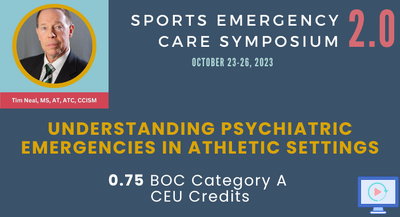General Course Information
Learning Material
Course Info (BOC Domains of Athletic Training; Presentation Description; Learning Objectives; Clinical Practice Gap Statement; Clinical Bottom Line; Summary Conclusions)
BOC Domains of Athletic Training:
- Domain I - Injury and Illness Prevention and Wellness Promotion
- Domain II - Examination, Assessment and Diagnosis
- Domain Ill - Critical Incident Management
Presentation Description:
This comprehensive presentation aims to bridge the gap in knowledge and preparedness among athletic trainers in managing psychiatric emergencies. The session will delve into the physical and psychological triggers that can lead to behavioral crises, common psychiatric emergencies, and potential violence-related issues in athletes. Additionally, it will provide a systematic approach to quickly assess athletes in psychiatric crisis and discuss principles for effective interaction and treatment.
Learning Objectives:
- Discuss and analyze the physical and psychological triggers for behavioral emergencies.
- Explore common psychiatric emergencies in athletic environments.
- Identify potential violence-related psychiatric emergencies in athletes.
Clinical Practice Gap Statement:
Athletic trainers may be well-versed in physical injuries but often find themselves inadequately prepared for psychiatric emergencies in sports settings. This can result in sub-optimal care or exacerbate the psychological crisis facing an athlete. The growing incidence of mental health concerns in athletes makes it imperative to close this educational gap, ensuring that athletic trainers are capable of both identifying and managing psychiatric emergencies efficiently.
Clinical Bottom Line Statement:
Being proficient in identifying and responding to psychiatric emergencies is an essential part of an athletic trainer's skill set. This expertise goes beyond mere recognition—it involves a deep understanding of triggers, rapid assessment techniques, and the implementation of effective, athlete-focused interventions. In doing so, athletic trainers not only contribute to the immediate well-being of athletes but also to their long-term psychological health.
Summary Conclusion Statements:
- Mastery in identifying both physical and psychological triggers is foundational for effective management of psychiatric emergencies.
- Becoming familiar with the spectrum of psychiatric emergencies specific to athletic settings enables more nuanced care.
- Prompt recognition and assessment of potential violent behaviors are vital for ensuring athlete safety and implementing crisis interventions.
- Emphasizing compassionate interaction approaches leads to more effective and athlete-centric psychiatric care.


